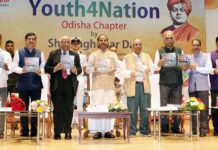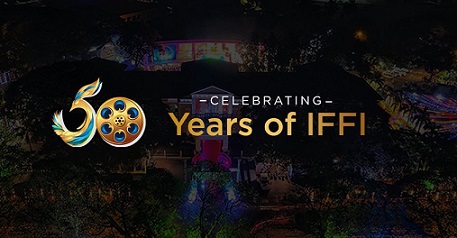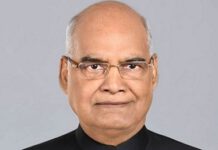By Our Entertainment Bureau
PANAJI/MUMBAI: ‘Hellaro’ is a film on women’s self-expression and liberation conveyed through the Gujarati dance form Garba. This is how Director Abhishek Shah describes his National Award winning filmwhich opened the Indian Panorama Feature Film Section at IFFI -2019 in Goa on Thursday.
The storyline is set in 1975. A young Manjhri is married off in a small village in the Rann of Kutch. There, she joins a group of women shackled by patriarchal mandates. Their only escape from the suppression is when they go out to fetch water every morning to a distant water-body. One day, while on their way to fetch water, they find someone in the middle of the desert and their lives are changed forever.
Speaking about the movie, Abhishek Shah said, “it’s a universal story rooted in tradition”. “It’s a journey from suppression to expression”, he added.‘Hellaro’ is the first Gujarati film to win National Films Award. The Director stated that lots of good experimental films are now being made in Gujarati language.This movie is contesting for the Centenary Award for the The Best Debut Feature Film.Actors Niilam Panchal andTejalPanchasara, Editor and Screenplay Writer Prateek Gupta and Producer Ayush Patel were also present at the press meet.
The cast of ‘Hellaro’ includes ShraddhaDangar, Jayesh More, TejalPanchasra and ShaileshPrajapati.Director Abhishek Shah has been a Casting Director for 15 Gujarati films. He has also been a writer, director and actor with mainstream theatre for over 18 years. He has also directed TV commercials and promotional films.
Ashish Pandey, Director of the film ‘Nooreh’, the first film screened in the Non-Feature Section of Indian Panorama, said, his film portrayed the dreams of children growing up in disturbed areas who long for a ‘beautiful world’ free of conflicts. Nestled in the Kashmir valley is a small village which is located on the India- Pakistan border. Its people are always caught in the crossfire between the two nations. One night an eight year old girl Nooreh discovers that the gun battle rages when she sleeps and the bloody duel stops when she keeps her eyes open.
This film has been shot at an Indo-Pak border village in Kashmir where kids grow up amidst conflicts and dream of a peaceful, “better” world, said Ashish Pandey. The cast consists of actual villagers and the dialogues are in the local dialect with Kashmiri and Urdu thrown in-between, he said.The film employs powerful imagery, combining violence and fantasy in a wonderful fashion. The cast consists of Noor, Sania and Afreen. Cinematographer SushilGautam was also present in the press meet.
Ashish Pandey also opined that films should make people more sensitive about the world in which they live and cultivate a sense of humaneness. He is a graduate from SRFTI, Kolkata with a specialization in Sound Recording and Design. He directed his first short ‘The Cabin Man’ (2007) followed by ‘Open Doors’ (2011) and ‘Nooreh’ (2018). He started the production company Sophiya Films. His filmography includes ‘The Cabin Man’, ‘Open Doors’ and ‘Nooreh’.
Meanwhile, Amitabh Bachchan inaugurated the Dadasaheb Phalke Award retrospective organised at Kala Academy in connection with the 50th International Film Festival of India in Goa. This year, the 50th edition of IFFI is showcasing a retrospective of Amitabh Bachchan as he was honoured with Dadasaheb Phalke award this year. IFFI 2019 will showcase 6 of the best films by Amitabh Bachchan in a separate section honoring the star’s achievement.
Speaking at the launch, Bachchan said, “I feel deeply humbled and would thank the Government of India for this prestigious award. I’ve always felt that I’m not deserving of such recognition but I humbly accept this with a lot of grace and affection”.
On the golden jubilee edition of IFFI he said, “This is the 50th edition of IFFI and I compliment the Government of India and IFFI for conducting themselves in such a wonderful manner. Each year we find a growth in the number of delegates and the choice of films giving us the opportunity to see the works and creativity from different parts of the world.”
Calling cinema a universal medium Shri Bachchan added that films are beyond the borders of language. “When we sit inside a dark hall we never ask the caste, creed, colour of the person sitting next to us. We enjoy the same film, laugh at the same jokes and cry at the same emotions,” he said.
He warned that there are few mediums left like cinema in this fast paced disintegrating world that can claim such integration. He expressed hope that we continue to make films that will bring people together.
The veteran actor also called for disintegration of the rather odd system of keeping sides due to colours, caste and religion. “We should bring us together in one community, hold hands together to appreciate the creativity and take a step forward to make this world a peaceful place,” he exhorted.
Bachchan who has a close connection to Goa fondly recalled shooting his first film here. He said, “Coming to Goa has always been like coming home and I’ve had many wonderful opportunities to work in this place and receive the hospitality from the people of Goa during our various stints of shooting.”
While Paa will be the opening film, the other films that are being screened in the Retrospective section are Sholay, Deewar, Black, Piku and Badla.






























